- Home
- Gregory Maguire
Egg & Spoon Page 14
Egg & Spoon Read online
Page 14
“What’s wrong with me?” The witch shoved her chin farther out in the air, and her eyes flashed. “I take my vitamins.”
Half the time Cat didn’t understand what Baba Yaga meant. She had learned to just keep gliding toward whatever shared meaning might be possible. “You aren’t exactly presentable.”
“I’m the very glass of fashion and the mold of form. Aren’t I, Mewster?”
“You look like a walking hairball,” said the kitten.
Baba Yaga clapped her hands. A wardrobe shuffled forward abjectly, reluctantly. The witch yanked open one door, on the inside of which hung a full-length looking glass. From where Cat sat upon a three-legged bench, she could see both the witch and her reflection. The one scowled at the other, and the other scowled back.
No one in her right mind would call Baba Yaga a spray of loveliness. She was no taller than Cat. Her legs and arms, clothed in tight black undersleeves, were spindly, rickety. Atop this she wore a belted black tunic cinched tight around her tiny waist. The way the fabric flared up toward her neck and down as far as her knees made her look like an all-black hourglass with arms and legs. How her scrawny neck carried her monstrous skull?— laws of gravity didn’t apply to Baba Yaga’s head. Her pallor was the dead white of snow, though she had trailed a few smudges of crimson paste across her lips, which wobbled from cheek to sunken cheek, string from an untied knot.
Her coiffure was her crowning ghastliness. Her tresses seemed neither black nor white nor grey nor silver, but perhaps a kind of dry marsh-grass color. They rose from her forehead like a hairy soufflé, reversed direction, and dove down her neck. Halfway down her back, they were gathered tightly in a cord. Below the cincture, the hair sprang out again with agitation.
The witch turned this way and that. “I think I’ve kept my figure, don’t you?” she asked Mewster.
“Who else would want it?”
“Don’t be snarky.” She batted her eyelashes at her reflection. “I do believe I have my mother’s eyes.”
“Maybe it’s time to give them back. Your mother’s been dead since the reign of Oleg the Incontinent.”
“And everyone says I have the sweetest smile.” She cracked open her lips. A few flakes of orange rust flew out of her mouth. Her teeth were made of iron and did not line up with conviction. “When a Russian maiden smiles, the balalaikas of the Volga boatmen strum in tune.”
She smiled. The balalaika hanging on the wall snapped all its strings at once, a tangle of catgut and atonality, prefiguring Stravinsky.
“Are you trying to tell me something?” she asked the instrument. The wardrobe tried to close its door and back away, but the witch said, “I’m not done with you, you!”
“Perhaps you should ask our visitor what she thinks,” said Mewster. “She comes from the world of the temporarily sane.”
“Well?” said Baba Yaga. “Go ahead, girl. Give me your opinion.”
Cat almost found herself wordless. Still, it was in her best interest to keep the peace. If she could help the witch pass through the court of the Tsar, she’d have a better chance of returning the Fabergé egg safely and of escaping the witch’s clutches at last.
“Among witches, there is no one I admire more than you,” said Cat. “But you may find that you draw more attention to yourself than is useful.”
“Explain yourself.”
“Well.” Cat thought before she spoke. “When I discovered you, you were hidden away in a sort of private snow globe of your own invention. You seemed to like to keep apart.”
“Human behavior is so tawdry,” admitted the witch. “Present company included. I keep to myself. As the lady poet said, ‘The soul selects her own society, Then slams the door.’”
“You’ve been able to display your own particular … glamour … in the refuge of your Dumb Doma. In a great city,” ventured Cat, “one wants not to draw attention to oneself. It’s not only safer, but more convenient. You wouldn’t want your progress to be slowed down by mobs of people coming after you.”
“To burn you,” whispered the kitten.
“To admire you,” insisted Cat. “You have business to conduct with the Tsar, you said. To warn him about the death of your personal winter, and press for an enquiry? You’ll make your way to his court much more easily if you can pass among humans as an ordinary person.”
“How revolting a notion. Still, I see what you’re getting at. So what do you propose?” Baba Yaga turned and stared at the mirror again. “Shall I arrive as an infanta from Prague or Seville?” The reflection in the mirror showed a huge-headed toddler in a golden gown, Baba Yaga’s face pivoting above a stiff white lace ruff.
“Babies don’t often travel on their own,” said Cat gingerly.
“You can push me in a perambulator. I shall wave like a queen.”
“I’m not old enough to be your governess.”
“Perhaps I should be a performer of some sort.” In quick order, the mirror organized images of Baba Yaga as Columbine without Pierrot, as Judy without Punch, and then as a chanteuse in a slinky black shift with a single dead rose in her hand.
“Better,” said Cat, “but still, a performer wants attention. What you want is to avoid attention.”
“So I could be, what? What kind of person gets the least attention in society?”
“Peasants?” offered the kitten.
“Oh! Slumming. What fun,” said Baba Yaga. The mirror worked up a new outfit and showed Baba Yaga sporting a head scarf and a pair of spectacles with elongated, translucent frames that came to a glittery point on each end. She was sheathed in a slurry-colored coat that plunged cylindrically to the floor, a fulsome tree trunk shorn of its bark. Drooping from her hands, two overladen paper sacks with handles. On their sides, in English, the sacks said BLOOMINGDALE’S.
“I haven’t met many peasants,” said Cat, “but those I have met don’t look like that.”
“You’re awfully fussy.”
“The girl knows the current world better than you do,” Mewster reminded Baba Yaga.
The witch shrugged. “If not a peasant, then what?”
The kitten turned to the girl. “What if she was your governess?”
“I take every second Saturday off and a week in the summer, and I refuse to sing stupid songs to make you behave!” shouted the witch.
The mirror struggled to get the outfit right. First, a black skirt rushed to the ground beneath a pale apron with grey stripes. Then the skirt retreated to mid-calf length, and sensible stout black shoes with laces appeared. A tight acid-citron waistcoat with big buttons. Cat thought it looked like the jacket of some hunter going out with hounds to catch a fox. Still, it could be a lot worse. “We’re getting close. What about that hair? Can you manage it in a bun?”
The mirror gathered Baba Yaga’s hair up onto the top of her head. There was so much that it looked like a giant bundle of shredded laundry. On the top perched a small green loden hat with a feather in it.
“I’m not loving it,” said Baba Yaga.
“The bun is too big.”
“Where am I going to carry my necessities?”
“A little reticule of some sort?”
The mirror shrank the hair and provided a carpetbag.
Baba Yaga snorted. “I look like a woman of a certain age.”
“You are,” said Mewster.
“Oh, no,” said the witch. “I am a woman of every age. What shall you call me, Cat, if you need to address me out on the pavements of Saint Petersburg?”
Cat thought of Miss Bristol. “Is Miss Yaga too personal?”
“If this is going to work, we’re all going to have to suffer,” said the witch. “Miss Yaga it is.”
I think, thought Cat, Baba Yaga is rather enjoying this.
I will only say this: As the private train bearing Madame Sophia and her retinue began its final approach to the capital city of Russia, a cloud of migrating grey wagtails, who favor marshes and wetlands, arose from where they rested. In concert, they made an ashy swerve
in the sky. Elena saw them and gasped.
I have talked a little bit about the Firebird. He is a living torch, a kingly flame. But here I point out numberless forgettable, nameless serfs of the breeze, turning this way and that, searching for a new way.
They shouldn’t be here. They winter in West Africa, I’m told, and usually return to Scandinavia and the great northern lakes, Ladoga and Onega, only in springtime.
They are too early. They are impertinent.
But the common grey wagtail came in a number of hundreds of thousands. Maybe millions, flying a grey rainbow above its grey reflection.
I USED TO SIT AT THE WINDOW OF MY PRISON. THE HORIZON, the sun and moon, all that tiresome flotsam. Haven’t I told you this before? I must have done. The birds, they were my unwitting allies. I borrowed their freedom and their sight. I flew with them over the landscape of the past, trying to discover what led to my downfall. I may have been muttering to myself all the while, but there was no one to tell me to just shut up.
I could see this train, loitering outside Saint Petersburg, one silver snake among many, waiting for permission to approach.
I could see this other train, hundreds of versts to the south, on which the hut of Baba Yaga sat, swinging its chicken legs.
All I could see had already happened, though. I couldn’t see forward, to the moment when someone came up the steps and unlocked my door, carrying either a writ of freedom or a pistol. Birds, alas, can’t fly to the future and bring back hope.
Except, I suppose, that bird in the Old Testament, who brought Noah a green signal, an olive branch of peace from the reviving world. I could have done with such a dove, such a branch.
No doubt Noah offered his wife that olive branch. Forty days in a boat with those animals to clean up after? A peace offering likely all that stood between their marriage and bloody murder.
Maybe she put the sprig in a clay jug of water to see if it would root, in case this little stem wasn’t the promise of a new world, but the last scrap of life in the old one. Women are smart that way, husbanding. Of course, Noah was husbanding, too.
I think about that branch, about that jug. About what we have and how we husband it.
Think of egg and spoon. If there is an egg, well, fine. You eat. Unless you use your spoon to hold the egg out of my reach. Does being in possession of a spoon give you more right to the egg? How about a knife? A throne? A purse full of cash?
Or maybe the spoon is what you use to share with. To lean over the bedside of someone’s ailing somebody and tuck a little soft egg into her mouth.
Egg and Spoon, I’ve learned, is the name of a children’s game. One version was played at Queen Victoria’s Golden Jubilee in London. Children carrying raw eggs in metal spoons raced to see who could get over the finish line first without dropping and cracking their egg. Another version has been featured on White House lawns in those far United States; this contest involves children pushing their eggs across the grass with long-handled wooden spoons. Both varieties involve winners and losers. Neither game mentions what the winner does with the egg. Or who consoles the crying children who are clumsier, or unlucky, or merely younger.
The dove flies and spies a sprig of olive; we earthbound mortals are chained by horizon.
If we are high enough to see the train bearing Elena and, hurrying along behind, the hut of Baba Yaga with Cat inside, we can’t help but see evidence of other people. Other dramas on other trains, probably. Other hungers, solitudes, incarcerations. If we dare notice. I bet the Firebird notices.
We can’t see into the future, no more than Noah and his wife on the high floods could. A certain enchantment indeed, could we learn to see into the present. Most days I do not, personally, manage this very well.
The disappearance of stock items from the witch’s larder was becoming habitual. “Are you running some sort of a cooking consortium behind my back when I’m asleep?” the witch demanded of Cat.
Cat: “I don’t cook. That’s the job for Cook.”
“Cook and Butler, Butler and Cook. I suppose you had someone to soap you in the tub too, lest your hands come in contact with your own personal grease.”
“Don’t be disgusting.”
“Don’t dare me. I majored in disgusting at Gulag Community College. Lucrezia Borgia taught cooking, and Madame Defarge taught knitting. Emperor Nero taught violin and also led the cheerleading squad. I skipped all my classes and failed with distinction.”
“I never know what you’re talking about. I hear the words, but you spout only nonsense.”
“She’s mad,” said Mewster. “Haven’t you noticed?”
“I’m not mad,” said the witch, rooting through a cabinet. “I’m a scad loose in the head, true, but redeemed by the genius of my personal glamour. If you must know, I’m hungry, that’s what I am.” She tossed out dusty hardtack, sacks of dried herbs, and an empty mousetrap. “Not much of a hunter-gatherer, am I,” she said.
“Conjure something,” said the kitten. “A babka of some sort, or blini with caviar. How about a nice bird-and-nest cake?”
“Enchanted supper is all empty calories. I’d dish up my famous porcupine stew, but I’m fresh out of porcupine.”
“Improvise,” said the kitten. “Do I have to suggest everything?”
“Are you volunteering? Kitty kebabs on a charcoal grill?” The witch opened a hinged panel in the wall and pulled out a stone fire pit, above which hung a battered copper basin.
“I never saw that before,” said Cat while Mewster leaped to the rafters.
“This house. Dumb Doma is always into self-improvement. Every time I turn around, behold, another airing cupboard or root cellar. Once I opened a door and there was a closet of the sort that the Americans call an elevator. If I’m not mistaken, it was invented by a man named Otis Elevator. Have you seen one? The English call it a lift and the French, l’ascenseur. I think the Dutch don’t believe in it; the Dutch are a low-lying people. The whole chamber rises to another floor. I took it up and found a penthouse done over in pickled birch wood, with a tiger skin thrown over the baby grand. Not to my taste, and maybe Dumb Doma caught on, as it’s never appeared again.” She threw a pinch of cayenne pepper onto the stones, and a roaring fire resulted at once. The house filled with smoke. Dumb Doma opened its own windows and flapped the shutters to clear out the stench.
“I just remembered,” said the witch, and drew a salted codfish from a purse beneath her clothes. “I was using this as a kind of personal sachet, but the time has come to sacrifice my vanity for the sake of dinner.” She threw the fish in the pot, and it began to flop around as if it had just been hooked. In a minute it was charbroiled. The meal seemed mouthwatering to Cat. I must truly be hungry, she thought.
The witch flipped the fish on a plate, picked up a fork, stabbed it, and swallowed the entire thing whole.
“Hey! What about sharing?” called the kitten from above.
“I forgot. I didn’t think you’d want any. I can bring it back up.”
“No, thank you. Is there truly nothing else?”
“Well, I sent you out to scare up a delivery of fresh meat,” said the witch to the kitten, nodding at Cat. “Instead of some peasant, you brought in a debutante armed with an ugly party gift for the hostess. Vexing, but there we are.”
“I hope you’re not going to change your mind and eat her now,” said Mewster.
“Don’t put notions in my head. A little princess stuffed with her own foie gras? Yummers. I’m still ravenous, by the way. That fish was only an appetizer. ”
“You’re scaring the child,” said the kitten.
“It’s too late for that,” said Baba Yaga, and Cat realized that this might be true. She was getting used to Baba Yaga. Crikey.
“Aren’t there some onions in a basket somewhere?” asked Mewster.
“Of course not,” said Baba Yaga. “No, we have no bread, we have no meat, we have no cheese, no milk. None of my famous Granny Yaga’s Frozen Tater Tots, made from
real tots. As the great sage put it, ‘When she got there, the cupboard was bare.’ And so what was there, they all had to share: Nothing.”
“You can’t share nothing. There’s nothing to share,” said Cat.
Unaccountably, she thought of Elena at the side of the tracks, glaring at Cat eating the apple. That green, green apple. She’d thrown half of it away, mindlessly.
Baba Yaga looked at Cat sideways. Sometimes when the witch was speaking like a loopy old bird staggering out of a gin parlor, she wore the keenest expression. “Listen, honeybucket. Kindergarten ethics. As far as I know, there are four ways to share. Count ’em with me.”
“Do I have to?”
“Let’s say you and I are in a nursery that has a couple of toys. We both want to play. One toy is a pretty doll, one of those nesting dolls, maybe. The other is, say, a little pearl-handled revolver with repeating action. What do we do?”
Cat sighed. School again. Miss Yaga was becoming Miss Bristol, always improving her charge. “We play together. We share.”
“All right. First rule: Everyone owns the treasure together. No one owns a part; we all together own all of it. In other words, sharing in ownership. So we play together. You take the doll, I take the gun. I shoot the doll. Fun for all. Then we trade. Your turn for the gun. You say to me, ‘Hand over the doll.’ I throw the doll out the nursery window. So now we only have the gun to share. What do we do now?”
“I guess we take turns. You have the gun for a while, then I do.”
“Good enough. That’s sharing, too. Second rule: Everyone owns the treasure in turns. In other words, sharing in time. Though whoever gets the gun first gets the advantage.”
“I understand,” said Cat.
“And I just enjoyed that codfish. You can eat it next. Doesn’t work for you?”
“Not when sharing it wrecks it.”
“Which brings us to the third rule: Every person singly owns an equal part of the treasure. Preferably before it’s worthless. In other words, sharing in portions. One part of a freshly prepared, edible codfish for me. One part for you. Better?”

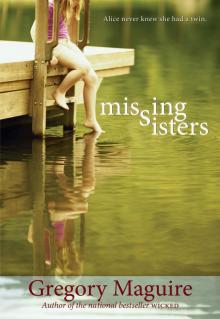 Missing Sisters
Missing Sisters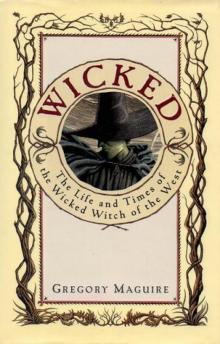 Wicked: The Life and Times of the Wicked Witch of the West
Wicked: The Life and Times of the Wicked Witch of the West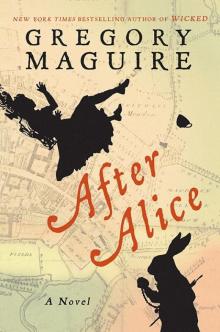 After Alice
After Alice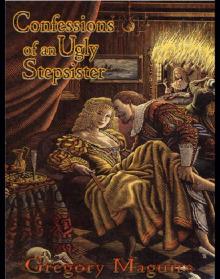 Confessions of an Ugly Stepsister
Confessions of an Ugly Stepsister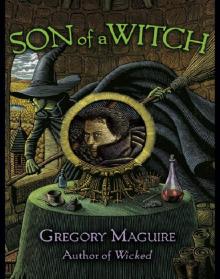 Son of a Witch
Son of a Witch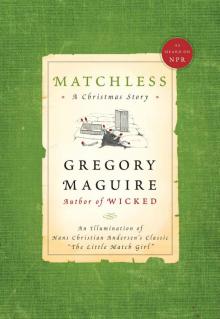 Matchless
Matchless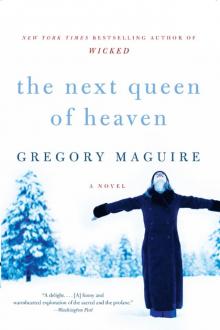 The Next Queen of Heaven
The Next Queen of Heaven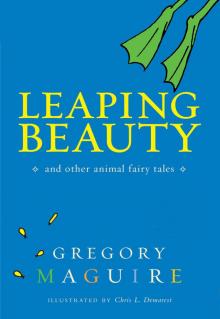 Leaping Beauty: And Other Animal Fairy Tales
Leaping Beauty: And Other Animal Fairy Tales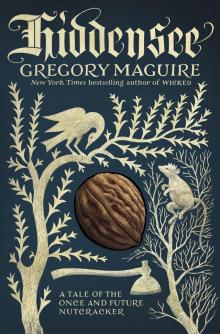 Hiddensee: A Tale of the Once and Future Nutcracker
Hiddensee: A Tale of the Once and Future Nutcracker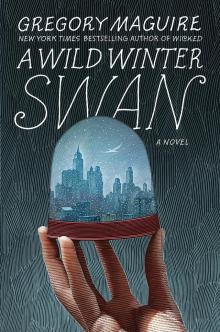 A Wild Winter Swan
A Wild Winter Swan Egg & Spoon
Egg & Spoon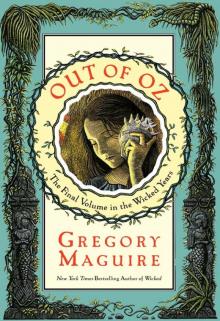 Out of Oz
Out of Oz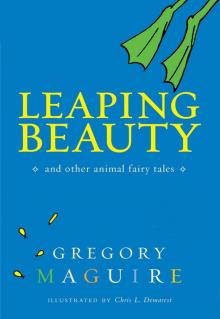 Leaping Beauty
Leaping Beauty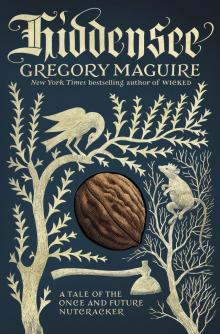 Hiddensee
Hiddensee The Wicked Years Complete Collection
The Wicked Years Complete Collection The Next Queen of Heaven: A Novel
The Next Queen of Heaven: A Novel